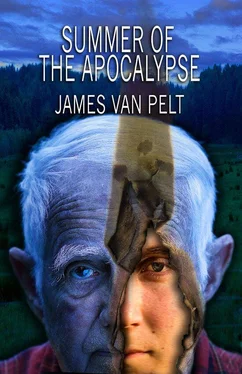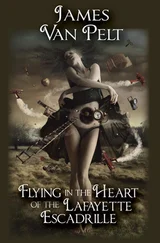Phil’s face clouded. “You’re right,” he said. “She wouldn’t like it at all.” He wiped his face with his rag.
“What’s a son to do?”
Dodge and Rabbit waited for him at the end of the path.
“Let’s not come back this way,” said Rabbit.
Dodge nodded in agreement. After he walked for a while, head down, kicking pebbles in front of him, he said, “But he did have nice toys.”
Eric thought about the cars in the showroom, mirror bright. Phil wandering among them, dusting each grudgingly for his dead but omnipresent mother. He thought about him sitting alone on his couch watching sixteen televisions at once. He thought about all the rooms filled from floor to ceiling with electronic gadgetry. He thought about Phil’s dwindling supply of non-renewable, non-repairable resources and what else Phil had told him when he showed him the tanker truck filled with diesel. “There’s enough to last me until I’m gone, and what do I care after that?”
“Yes, they were nice toys,” said Eric.
He guessed they would be in Golden before noon, and he realized they would be within a couple of miles of the cave where his mother was buried. “We’re going to take a little detour today,” he said. “Want to show you something.”
A breeze from the hills to the west cooled them. The clear sky was blue, high and vibrant. Eric felt good. He felt as if he could hike forever.
Eric heard his father talking, and that was all he heard. His soft voice filled the cave. “I read a book once that discussed the filming of the 1933 King Kong, a wonderful movie. Great special effects. When that sad ape climbed the Empire State Building, and all those biplanes buzzed around like mosquitoes, I cheered. Smash those planes, I said. Crush them out of the sky.” It had been a week since their trip to Idaho Springs. Dad held Mom’s hand. Eric supposed he’d held it all night as her coughing worsened and the fever built. With a wet washcloth he’d wiped her forehead, but he never let go. When Eric awoke, Dad was holding on. Mom’s face glowed with fever. She’d lapsed into a coma. An hour later, she died. Now the lantern’s light dimmed and brightened. It was low on fuel. Eric sat cross-legged on the rock floor of the cave near his mother’s feet. He reached out to touch her leg, brushed the rough blanket, then pulled his hand back. He imagined her leg would feel hard, wooden. He didn’t want to know. Dad talked. Eric had never heard him like this, non-stop, a droning monotone.
“The funny thing was, about this film, the Hays Office censored it. Nowadays they’ll show any god-awful thing, but King Kong they censored.”
Dad leaned forward as if his stomach hurt. “There’s a scene on Skull Island, before Kong goes to New York, where he chases Fay Wray to the giant barricades that are supposed to protect the village from him and the prehistoric monsters on the other side. He reaches over the wall—they used a sixteen inch model for all the shots; I didn’t know that—grabs a villager and bites his head off. That’s what the Hays Office censored. Too graphic, I guess. But the next scene Kong pushes down the barricade, crushing twenty or thirty villagers.”
He’d been talking steadily for two hours. Eric supposed he should feel grief, but he didn’t, really. His eyes felt pressured like someone was pushing thumbs into them, and his face seemed heavy; the corners of his mouth dragged down and no effort could move them, but he didn’t want to cry. The woman lying under the blanket wasn’t his mother, not the one who toted a shotgun so jauntily the last weeks, not the one who woke him for school or bought him milkshakes when they went shopping. She was just a body, and Eric had never seen a dead person before. He didn’t know how to behave around one. He sat, and his dad talked.
“I didn’t understand why they censored that scene. Stupid thing to do. Hundreds of people died in this movie. Why’d they take out one death? The expedition chased Kong, trying to save the girl. Kong crossed a log over a chasm, and, when the men followed, he picked up one end and shook them off, down and down into the ravine. Why not that scene? So I read in this book a theory that the death of one is more horrible than the death of many. It’s psychological. Kong nips off a head like you’d bite the end of a hot dog and the censors cut it out, but he can smash a faceless crowd.” He rocked back and forth. “One death,” he said, “hurts too much.” The Coleman lantern sputtered, then lapsed into the rapid fire fut-fut-fut that meant it would go out any second. The light turned Dad’s face into a dancing moonscape of black shadows. He started coughing, a long series of dry, painful sounding explosions that made Eric flinch.
When he finished, he moaned quietly and leaned forward again so that he trapped Mom’s hand between his chest and his thigh.
Behind Dad a pile of canned goods caught the flickering light but the cave wall beyond reflected nothing. Its gray and black surface sucked in light, returning darkness. Eric stared at it for a long time until he saw high on the dull stone that someone, some earlier explorer, had carved a heart and scratched within it in barely visible, shaky letters:
Martha W. loves George
“Dad,” Eric said finally, “we should take her home.”
The lantern flared for an instant, then winked out. An afterimage of the inscription on the wall drifted in front of Eric, the letters and heart now dark on a lighter background. His dad inhaled shakily, held the breath, then let it out in a long hiss. He said, “I’ll go into town and bring back an ambulance.” Clothes rustled and Eric heard his dad’s back crack as he stood. “You stay here with your mother.” After lighting a battery lantern, then covering Mom’s face, Dad took a filled canteen and dragged his bike out of the entrance to the cave. His parting words were, “I’ll be back before sunset.” As Eric sat on the cold stone floor an hour later, he suddenly wished very deeply that before Dad had left that he would have held him close, then kissed him goodbye as he had when Eric was a child. Three hours after sunset, Dad still had not returned. Eric took a flashlight to the watch post and listened to the creek rumbling beside the highway below. Clouds obscured the stars, but the night was not dark. To the east, toward Denver, the clouds glowed redly. In the nights before when it was overcast, the lights of Denver lit the sky a pleasant, even electric white, but tonight the clouds boiled like bloody sheets. He retrieved the Mutant Ninja Turtle radio from under a rock where he stored it, but it gave him almost no news. Over the last weeks, fewer and fewer radio stations stayed on the air. Tonight he found several channels squealing out the emergency broadcast signal, interrupting themselves every few minutes with a message to tune to KTLK for information about the “current situation.” KTLK, however, played elevator music, and the only announcement Eric heard was one warning people to obey the curfew and to report looters to the proper authorities.
He flashed his light down the trail, hoping to see his father, though he knew Dad wouldn’t attempt to climb up without using a light of his own. Eric wrapped his sleeping bag around him. His muscles ached as if he’d lifted weights for hours. He’d never been so tired in his entire life, so old and drained. A breeze rattled branches. He flicked the flashlight on again, and its dim light penetrated the thin cloth of his sleeping bag. He thought he might go to sleep, but the idea that he could miss his father frightened him, so he pinched his leg hard. The pain almost felt good. It was real and immediate and normal, not like the body lying in the cave or the horrible red clouds that rolled languidly above him. He thought he should be mourning, and it worried him that he wasn’t. Don’t I love my mother? he thought. Am I a beast, some sort of sociopath? (He’d heard the term on television one night applied to a serial killer.) He thought about going to school. If everything straightened itself out, or if this is just a nightmare, I’ll never hate school again. I’ll go to class and smile at teachers and do homework and I won’t call anything stupid ever. The cliff walls across the canyon lit brilliantly. Eric blinked back tears, the light was so bright. Then all was dark. What? he thought. The air swelled like a crack of thunder, a great slam of sound that pushed on Eric’s chest. He screamed, but he couldn’t hear himself. Then echoes sounded for several seconds. He thought, this is nuclear. The end of the world for sure. In the distance toward Golden he thought he heard rocks falling, though the ringing in his ears prevented him from being positive. Movement down canyon caught his eye. A wall of darkness slid toward him, swallowing the highway, blanking the glimmer of the river. He stood on the rock, trying to see better as the darkness rolled by below. Whatever exploded between him and Golden had kicked up a cloud of dust; he decided it must be the tunnel. Someone blew up the tunnel.
Читать дальше












